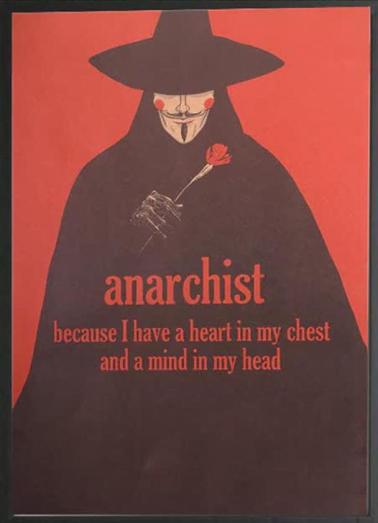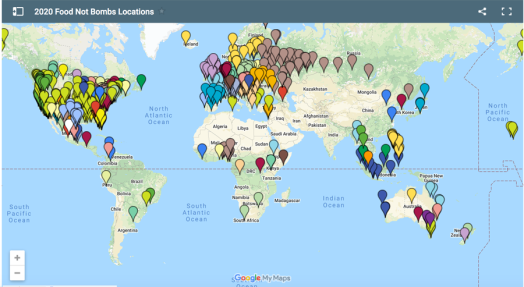I am disturbed by the use of ‘anarchist’ to describe those storming our U.S. Capitol yesterday, and want to point out that they were not actually Anarchists, but Trumpists.
No self-respecting anarchist would pull down the American flag just to replace it with a Trump flag. Anarchists bow to no human structural authority: the anarchist tenet for creating a better world is everyone acting from a place of ‘freedom plus responsibility.’ Each person ideally aids the community according to ability, and therefore also everyone mutually benefits.
“An-archist” literally means no hierarchies. It does not mean doing whatever you want simply because you want it. The Capitol’s violent raiders are instead minions of a mad racist, sexist, wanna-be totalitarian Emperor, so exactly the opposite of anarchists. I’m actually surprised Trump’s ploy of stirring them up into a violent froth didn’t win him the ability to invoke martial law – again, the opposite of anarchy.
***

I posted the above paragraphs on Facebook this morning. They got a lot of comments and fomented interesting discussion, so I decided to share it here too, with yet! more! additional context. If you’re interested, read on for more about Anarchism, followed by my personal experience as part of a contemporary anarchic collective.
***
Anarchism is a system of government that is non-hierarchical in nature. (The suffix “-archy” refers to that sort of linear up-and-down power structure. Think hierarchy and patriarchy.) Contrary to popular belief, though, anarchy does not equate with violence, disorder, or chaos. True anarchy depends upon its citizens subscribing to both freedom and responsibility.
You might argue that you’ve never seen an anarchic group that fulfilled its visionary potential. Freedom plus responsibility is indeed a hard thing to pull off on a large scale, since few people actually want to do the dishes. 🙂 But we could argue the same about pure capitalism and communism too. If you can find an example that has actually worked as ideally envisioned without corruption setting in, please tell us about it.
Anarchy was an important movement in the late 1800s-early 1900s, with such famous proponents as the Russian “anarchist prince” Pyotr Kropotkin and Emma Goldman helping to wake up, rile up, organize, and empower workers and women in America. Kropotkin collected examples of empowered individuals helping one another in community, each according to their ability, in what he called “mutual aid.” My favorite chapter illustrates forms of mutual aid enacted by other-than-human animals. Collaboration among free agents seems to be a foundational principle to life in Earth.
Anarchists were also active in the Resistance during the rise of fascism in Europe and WWII.
But it is far from a new idea: anarchic themes can be readily found in the writing of 6th-century Taoist philosophers Lao Tze and Chuang Tzu.
It is also not simply a historical curiosity: witness contemporary ‘green anarchists’ such as Derrick Jensen and John Zerzan. They say that rather than meaning ‘out of control,’ anarchism actually means ‘not under their control’ – in other words, not allowing oneself to be controlled psychologically and physically by the currently dominant hierarchical, patriarchal paradigm. Instead, an anarchic system is self-organizing, self-regenerating, and mutually beneficial for all involved instead of only benefiting a powerful few. Even while sometimes using violent means to get there, anarchy is, at the heart, a utopian movement.

Food Not Bombs: My Experience
I was part of a self-designated anarchic collective during the early 1990s, Food Not Bombs. This loose-knit band of volunteers successfully fed hundreds of people for free on the streets of San Francisco every day. A regular distribution site was in front of City Hall – in part because that’s where a lot of hungry working-poor and homeless people lived, and also just for visible orneriness. We ran this operation solely on coins donated in a can, when the city itself struggled to do the same in its official capacity on a fat budget. FNB delivered at least one and sometimes two or three meals a day, all made of delicious organic produce and bread that would otherwise have gone to the landfill due to being slightly bruised or past its ‘sell-by’ date. The vegies were collected from food stores in a raggedy van, then cooked into soup by groups gathering in volunteers’ home kitchens. All tools were meticulously cleaned, the cooking was joyful and fun, and the soups came out hot and delicious. We volunteers regularly partook too – a blessing in the life of an impoverished grad student.
FNB volunteers were regularly arrested, due to not having a permit to distribute food. As this costly inconvenience didn’t stop us from continuing the practice, I suppose the commonly held view of anarchists being lawless and out of control proved true. But this was a classic Catch-22 situation: we couldn’t get such a permit because our home kitchens were not regulation restaurant standards. And there was of course no way to make even one of them regulation standard, especially on our donation-can-based budget. I actually felt quite disappointed to never be among those arrested. It was just bad timing, I guess: I was never serving on a day the tables got raided. As one of the group who most loved words, story and rhetoric, I really hoped for the opportunity to speak in court, in the city named after St. Francis, about the ironic, painful injustice of being arrested and facing jail time for the horrible crime of feeding the hungry.
Making decisions with Food Not Bombs wasn’t always easy nor fast, as they were all made by consensus at weekly meetings. This offered my first exposure to decision-making processes that weren’t based on the usual straightforward hierarchical power structure where the ‘boss’ made the rules, nor a nominally democratic voting model that being win/lose, still winds up excluding the minority voices, desires and needs. Decisions at FNB were entirely based on a non-hierarchical consensus model, so were discussed until everyone could agree. You might not get your original first choice, but you would gladly agree to another choice now because it had become clear that this was the best decision for the group at this time.
I loved learning the consensus model of decision-making. I found its formal structures very usable and its processes and outcomes profound. People had their differences, natch, and tempers could fly. But still the soup got made and people got fed. And naive youth like me learned a lot. Leading through example, one elder homeless woman with a keen mind, ratty hair and few teeth who also served as a volunteer helped me recognize and challenge patriarchal norms as they were happening on the ground – even among comrades. I began waking up to ways in which I habitually gave away my own personal power to men. I have also since brought the formal principles of consensus decision making to many other groups.

Food Not Bombs was begun in San Francisco, California by Keith McHenry. It has since grown to have chapters in many cities all over the world and a presence at numerous direct protest actions, music festivals, and other change-making events.
I am proud to say that I have taken part in a successful mission-driven anarchist collective. The experience made me a better person. And I can attest that no bombs were in sight, except in the name. The logo of this peaceful band of anarchists offering “free soup for the revolution” features a carrot in fist instead.

***
References you might enjoy following up with:
- Food Not Bombs – the organization’s website
- Goldman, Emma (1908, March 17). A Beautiful Ideal. NOTE: This is a short lecture which Emma Goldman planned to give before the Edelstadt Social at Workingmens’ Hall in Chicago on March 17th, 1908. But she was prevented by Captain Mahoney of Maxwell Street Station, with a squad of about fifty police. Free PDF, courtesy of The Anarchist Library. (Who knew that existed? Finding stuff like this is the best part of writing blog posts!)
- Kropotkin, Pyotr (1902). Mutual Aid: A Factor of Evolution. NY: McClure, Phillips and Co. NOTE: Please note the age of this publication and forgive him for examples of non-inclusive language that we now have, thankfully, moved past. Free PDF
- Skirda, Alexandre (2002). Facing the Enemy: A History of Anarchist Organization from Proudhon to 1968. Edinburgh, Scotland: AK Press. NOTE: I just came across this book whilst searching out a free version of Kropotkin for you. So I haven’t yet read it, but want to. Blurb: “Skirda argues that the core problem for anarchists has been to create a revolutionary movement and envision a future society in which the autonomy of the individual is not compromised by the need to take collective action. How anarchists have grappled with that question in theory and practice make up the core of the book.” Free PDF
Finally, thanks to my friend CL Morden for the observation in discussion that anarchy “does not mean doing whatever you want simply because you want it.”







